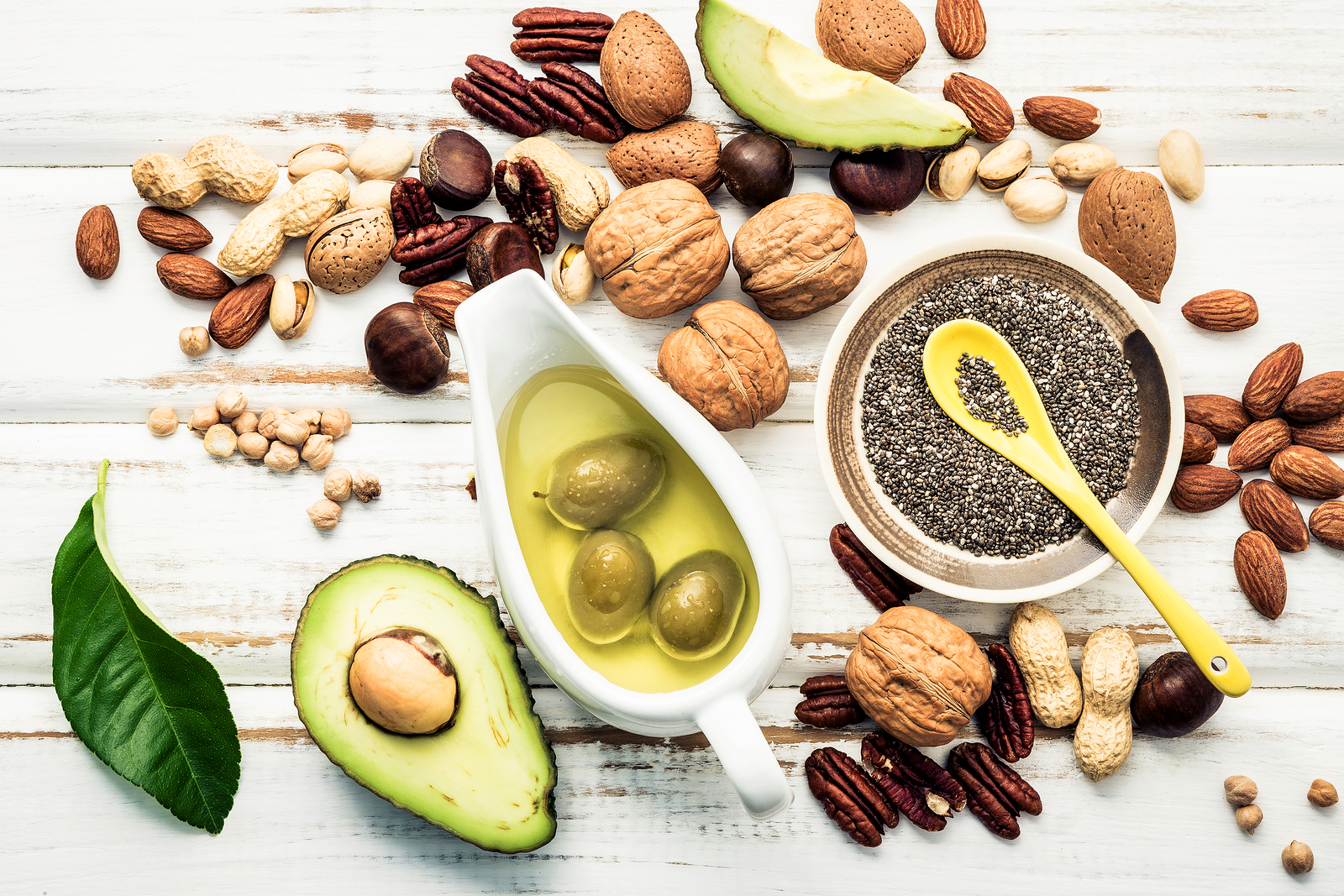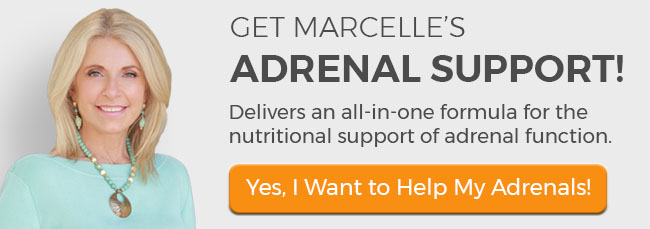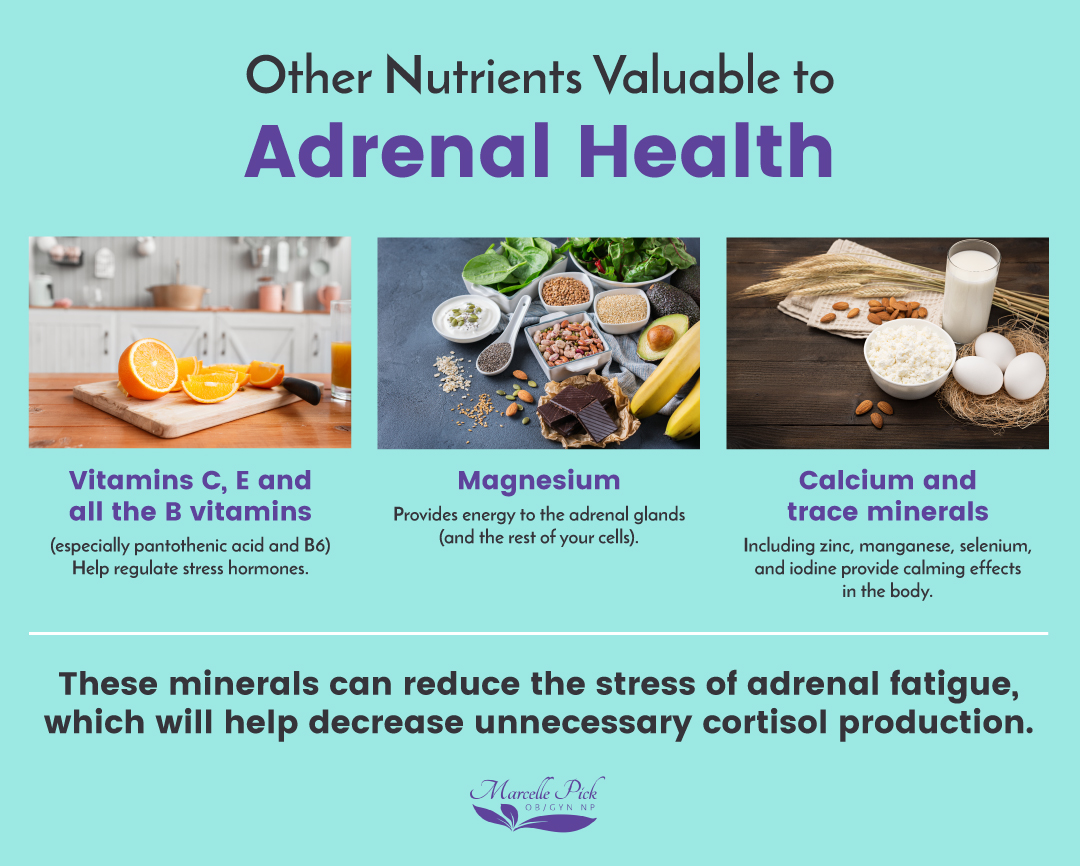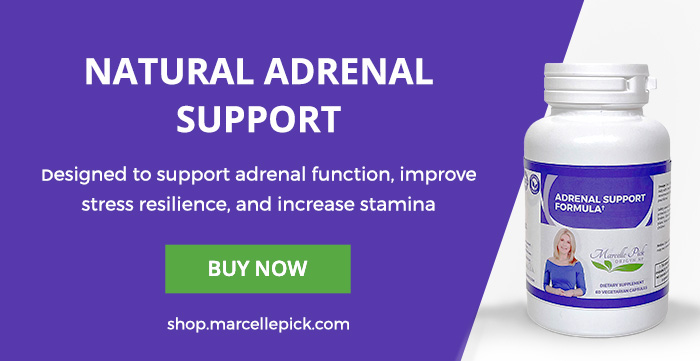Have you ever stopped to think about what stress might be doing to your body? I talk with my patients and listen to their diversity of health issues. I hear a common thread with the root of their symptoms: too much responsibility that is impossible to manage.
Struggling just to make it through each day, many women find themselves overloading on caffeine, sugary snacks, alcohol, and even sleep aids–simply to manage their stress. These habits can disrupt their body’s normal rhythms, and we’ll see why when we cover the functions of the adrenal glands.
If your adrenal glands are in distress, now is the time to find the right support of them. In addition to healthy habits and supplementation, eating certain foods for adrenal fatigue can have a positive impact on your adrenal health.
The Adrenal Glands and High Cortisol Levels
Research shows that when we experience chronic stress, our adrenal glands–the tiny glands that moderate the stress response–will suffer. These walnut sized glands have an enormous job, producing many hormones that regulate our body’s functioning. This includes cortisol, a hormone activated when our stress levels rise, which signals our body to enter a heightened state of emergency.
But high cortisol levels are intended to be short term; prolonged elevation of cortisol can create a myriad of issues in your body. The problem is, our adrenals do not know the difference between different kinds of stressors; they continue to pump out cortisol whether we are stressed due to a true emergency or are managing life’s everyday stressors.
What happens when cortisol levels remain high? So many things: high cortisol levels interfere with many of our bodies’ functions, including our immune function, digestion, sleep, and even the ability to produce other essential hormones such as estrogen, progesterone, testosterone, and thyroid hormones. When these functions are compromised, you can develop high blood pressure, high blood sugar, excess abdominal fat, and inflammation. And these issues, in turn, compromise overall health, mood, and even sex drive.
Things can take another bad turn when the adrenal glands are compromised long term. Eventually, they have a decreased ability to produce cortisol, and instead produce extra adrenaline. Though an adrenaline boost every now and then is useful, excess adrenaline in our systems can cause us to feel irritable, shaky, lightheaded, and anxious.
Adrenal Fatigue Development
All of this pressure on our adrenals can lead to adrenal fatigue, a syndrome that can, over time, cause low blood pressure, allergies, and pure exhaustion. But even if you’ve hit adrenal fatigue, it’s not a point of no return; the condition is not irreversible.
That’s good news, isn’t it? Adrenal dysfunction can be healed. A great place to begin, as always, is looking at your nutrition. Nutrition won’t take care of the problem all by itself – you’ll also need to find ways to decrease chronic stress and adjust your emotional response to stressors. But a change in what, when and how you eat is a fantastic first step in reversing adrenal fatigue. Let’s talk about some of the dietary approaches that can not only support your adrenals, but also improve your energy and promote better sleep.
Timing Meals and Snacks for Optimal Adrenal Function
How do you feel when you wait too long to eat? If you’re like many people, you can find yourself getting irritable and having trouble concentrating when it’s been too long between meals. This is your body trying to tell you something – and ignoring it too often can have a significant impact. That’s why the first thing I suggest to patients is that they make sure they never allow themselves to get too hungry.
What exactly happens when you go too long without nourishing your body? Your adrenals go into overdrive trying to release enough cortisol to adequately maintain consistent blood sugar levels in between meals and overnight. This is important because if your blood sugar drops too low for extended periods of time it prompts a stress reaction, which taxes the adrenals. To function properly, your body needs energy all the time –even when you’re sleeping! That’s why regular meals (I recommend three meals and two snacks each day) are essential.
What time of day you eat at can also have an impact on your adrenals. Cortisol levels follow a natural circadian rhythm, beginning to rise around 6 am, peaking around 8 am, then gradually declining throughout the day (with a slight rise at meal times) as your body prepares itself for rest. At night, your cortisol continues to taper off, and reaches its lowest level while you sleep.
Paying attention to the timing of your meals works with – not against – this natural cycle, avoiding dramatic increases and dips in cortisol. Eating larger meals early in the day and eating an early dinner (by 6 pm), as well as making your evening meal the lightest of the day, helps regulate cortisol and maintain hormonal balance. Night-time snacking habits (which I often hear from my patients are an attempt to self-soothe) often result from residual cortisol that stimulates the appetite; it’s important to try and curb these impulses, as they further disrupt your hormonal balance.
Exercise will also increase cortisol levels, so enjoying less intense activities while trying to heal adrenal fatigue is important. To keep cortisol levels as smooth as possible, so stimulating exercise in the morning or early afternoon when cortisol is higher. If you exercise in the evening, lighter activities, such as walking, restorative yoga, or other gentle stretching is a better choice.
If Cortisol is Higher in the Morning, Why Don’t I Feel Hungry?
The old adage about breakfast being the most important meal is actually true. Eating a nutritious breakfast that includes protein within an hour of rising will help balance your metabolism and cortisol throughout the entire day. But it’s hard to eat when we don’t feel hungry, even if we know it’s important.
Reasons you may not feel hungry in the morning:
- Corticotrophin-releasing hormone (CRH) enters the bloodstream at a quick rate first thing in the morning, and CRH is known to dull the appetite.
- Decreased liver function also quells morning hunger; and adrenal dysfunction often leads to decreased liver function.
Tips to Help Support Your Natural Cortisol Cycle:
- Eat breakfast within an hour of getting up, or by 8 am, to restore blood sugar levels after nighttime depletion of glycogen.
- Around 9am – eat a healthy snack.
- Have lunch between 11 am and noon. Energy from breakfast can be used up quickly, and having lunch early will prevent a large dip in cortisol levels.
- Between 2 and 3 pm – eat a healthy snack to help offset the natural cortisol dip that occurs around 3 or 4 pm. Many people reach for extra caffeine or carbohydrate-loaded snacks when they notice this dip, but those will actually impede hormonal balance.
- Have dinner between 5 and 6 pm and although it may be difficult at first, try to eat a light meal. Eventually your body will enjoy digesting less food in the evening.
- Eat a nutritious, light snack an hour before bed, but be sure to avoid refined sugars. Nut butters with fresh fruit or cheese are ideal choices.
When we properly time our meals and snacks to support our natural rhythms, we can prevent dramatic drops in blood sugar and boost our body’s natural functioning. Instead of focusing on producing cortisol constantly, our adrenals can instead perform their other important secondary functions. And we’ll quickly discover we have more energy – and more happiness – throughout the day!
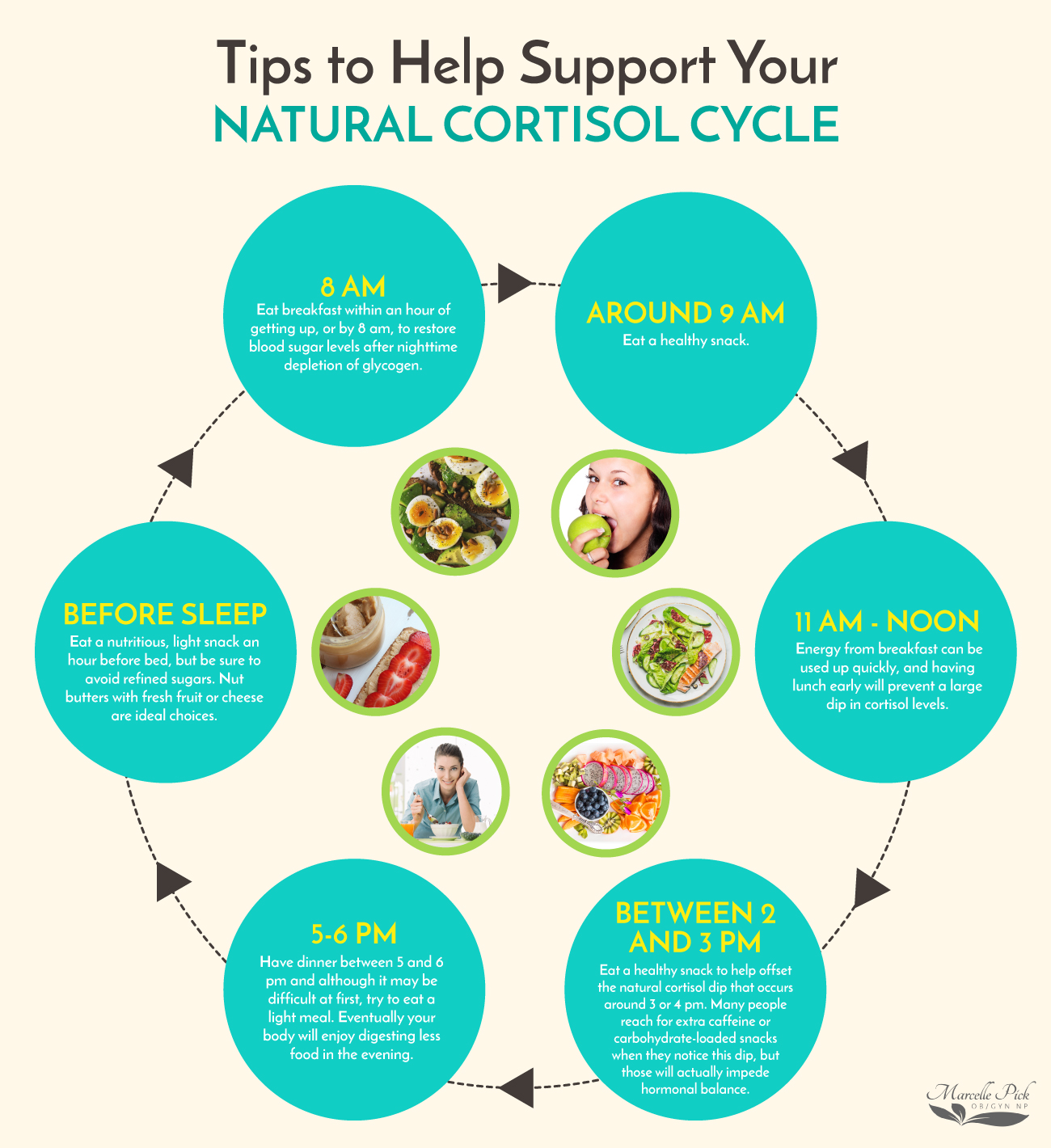
Foods for Adrenal Fatigue
Now that you know how when you eat impacts adrenal function, it’s time to think a little more about what you are eating as well. Choosing the right foods for adrenal fatigue can help you feel that much more amazing, but choosing the wrong ones could also have negative effects.
Making the Right Choices
Fighting adrenal fatigue is exhausting, and reaching for quick and easy (not to mention tasty) snacks such as cookies, doughnuts, candy, colas and coffee drinks is common. After all, it is natural to crave sweets when your blood sugar drops. Unfortunately, the energy we get from these types of foods is short-acting. The quick spike in blood sugar followed by a spike in insulin levels clears from our bloodstream so fast that we refer to this process as a “crash.” And I don’t know anyone who considers a crash of any kind a good thing!
Stress and exhaustion, when combined with hunger, can impede our ability to make healthy choices. When we aren’t aware of the effects that too much caffeine and refined carbohydrates have on our bodies we may not realize we are affecting our hormones and how they function, as well as our sleep patterns, by consuming them. Gluten can also be especially tough on the adrenals. I often recommend a gluten-free diet and limited caffeine to my patients who are suffering from adrenal fatigue.
Caffeine and carb cravings might mean low cortisol levels or a serotonin imbalance, but it might also just be your body’s way of saying it needs a break. Don’t ignore that request! Taking a few deep breaths, or a 10-minute walk in the sunshine can work wonders!
Eating & Avoiding Foods for Adrenal Fatigue
Let’s go over what to choose when considering foods for adrenal fatigue.
- Eat fresh, whole foods – preferably organic, locally grown, seasonal food – for meals and snacks.
- Avoid preservatives, added hormones, artificial colors, dyes, and chemicals.
- Include lean protein with each meal and snack (this is especially important in the morning) to help stabilize blood sugar and stave off cravings for refined sugars and caffeine.
- If you buy prepared food, try to buy it at a health food store or grocery store that offers natural, whole foods.st
- Try to prepare extra nutritious snacks to have on hand so they are ready and available when you are having cravings.
Beverages also make a difference to your adrenal health. If your routines include adrenal draining liquids like alcohol, sports drinks, or caffeinated drinks, this handy chart can show you some alternatives.
| Adrenal draining | Adrenal restoring |
|---|---|
| Drinks that contain caffeine* | Ginseng [Panax sp.] Eleuthero/Siberian ginseng [Eleutherococcus senticosus] (in the morning) |
| Alcohol | Herbal teas like chamomile, passionflower, valerian |
| Gatorade | Vegetable juice (with salt), like V-8 |
* If coffee is a must, try to have one cup in the morning with a nutritious breakfast.
Salt and Adrenal Imbalance
My patients are always surprised when I tell them to give in to their cravings of salt during periods of adrenal fatigue. Salt cravings in adrenal insufficiency are related to low levels of a steroid hormone called aldosterone. This hormone helps the body maintain salt and water as a way to help regulate blood pressure. When cortisol goes up, aldosterone goes down. Like cortisol, aldosterone fluctuates throughout the day, and is also influenced by stress. Chronically low levels of aldosterone can impact electrolyte balance, and sodium intake is one way to help correct this imbalance.
If you experience lightheadedness when you get out of bed in the morning, or when you get out of a hot bath or shower, you may have hypotension or low blood pressure. This is a common side effect of adrenal insufficiency, so adding good quality-salt, such as Celtic sea salt, could be helpful to manage those symptoms.
Other Nutrients Valuable to Adrenal Health
Vitamins, minerals, and micronutrients found in a pharmaceutical-grade supplement (Click here for information on our high quality, specially formulated supplements) are essential to restoring adrenal health, and supporting the entire endocrine system. Not only can they help the healing process, but they can provide extra nutrition to our cells, and support proper adrenal functioning every day. Following are some of the most important to adrenal function:
- Vitamins C, E and all the B vitamins (especially pantothenic acid and B6) help regulate stress hormones.
- Magnesium provides energy to the adrenal glands (and the rest of your cells).
- Calcium and trace minerals including zinc, manganese, selenium, and iodine provide calming effects in the body. These mineral can reduce the stress of adrenal fatigue, which will help decrease unnecessary cortisol production.
Herbal support can help your body heal as well. Adaptogens are herbs that actually adapt to the individual needs of your body, providing the additional essential support your adrenals need. Begin with the first two herbs listed below, along with B vitamins. If you do not notice improvement within a few weeks, be sure to consult with a naturopathic or functional medicine provider for evaluation and a program that evaluates your specific needs.
- Ashwagandha (Withania somnifera)
- Eleuthero / Siberian ginseng (Eleutherococcus senticosus)
- Astragalus root (Astragalus membranaceus)
- Schisandra (Schisandra chinensis)
- Rhodiola rosea
- Licorice root (Glycyrrhiza glabra)
Final Thoughts on Foods for Adrenal Fatigue
Making necessary dietary changes may prompt us to feel some stress, which of course does not help break the stress-patterns that have already depleted our adrenal glands. It’s important not to beat yourself up if you veer off course occasionally. When you get discouraged about veering off course, you might be tempted to abandon the health path altogether. Don’t do it! Doing your best 90 percent of the time is all I ask. Guilt is not a healthy way to support your adrenal glands!
It’s amazing to think that the adrenal glands have so much power over our functioning. When they are working properly they offer balance – providing us with energy when we require it, and helping us feel relaxed when it’s time to rest. The burden is great on our adrenals, and they can become impaired under the heels of long term stress, even in otherwise healthy people. But we can make small choices that can dramatically impact their functioning for the better – particularly around the things we put in our bodies. Making sure you are supporting these important glands by eating nutritious food, boosting with high quality supplements, and paying attention to when you eat in relation to your body’s natural rhythms can make all the difference!
For more information, read our many informative articles in our adrenal health section and take our online Adrenal Health Quiz.

